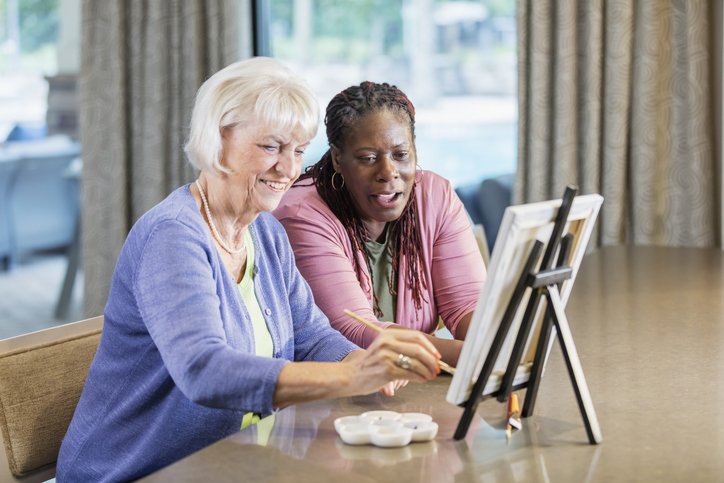
These DIY sensory activities can help minimize agitation in dementia patients.
Swift changes in moods are characteristic outward indications of dementia, and can be extremely difficult for family caregivers to work through. One minute you may be enjoying a pleasant activity together, when apparently out of thin air, the senior’s countenance shifts. You might then find yourself walking on eggshells as you carefully try to resolve an issue you don’t completely understand.
Though it’s useful to identify the main cause behind intense emotions like fear, anxiety, and agitation in dementia patients, unfortunately, it’s not always feasible. There may be a known cause, such as hunger or boredom, that can be easily rectified; but there might be more arbitrary triggers, such as the older adult recalling a distressing memory from decades ago that they’re not able to talk about. To help minimize agitation in dementia, sensory activities can be extremely helpful.
What Should I Do Now?
After confirming the senior isn’t in pain or physical distress, there are two crucial actions you can take:
- Journaling: Keep a notebook readily available while taking care of the older adult. Record the date, time, and any other info relating to an incident of agitation. For example, note if the senior had just woken up, had just finished eating dinner, hadn’t used the bathroom for a few hours, was watching the news on television, etc. The time of day is particularly important to write down, as people with dementia frequently suffer from more anxiety in the late afternoon and evening. By using a journal to keep track of incidents, it’s easier to see patterns and commonalities to help prevent future occurrences.
- Diversion/Redirection: After acknowledging the feelings the older adult is having, it is often beneficial to move into a different area of the home (or even go outside if the weather is nice enough) and shift the focus to something pleasurable. If it’s been a long time since breakfast, a mid-morning snack in the porch might help. In the event that the senior is wandering or pacing, try heading out for a walk around the block or even the park. Oftentimes, listening to favorite music can provide feelings of relaxation. Try a variety of strategies and write down the outcomes in your journal for future reference.
Engaging the Senses
Sensory exercises can help preempt or provide distraction from difficult mood swings and agitation in dementia. Try some of the following creative ideas from At-Home Care Company, a provider of home and dementia care in Altoona, IA and the surrounding areas:
- Perfumed Cards: Cut pieces of cardboard and attach fragrant items in small sealed plastic bags to one end. Use a number of scents that bring to mind memories or a sense of peace: peppermint, coffee, suntan lotion, cinnamon, pine needles, chocolate, etc. Use your imagination and talk about each fragrance while enjoying them together.
- Aquarium Bag: Fill a big zip-lock plastic bag with water beads and a number of small plastic aquatic animals, plants, etc. Employ this idea as a jumping-off point to other sensory bags with different themes according to the older adult’s unique interests.
- Homemade Paint: Make up a batch of this safe, nontoxic paint to have easily accessible, which can be used for either finger painting or brush painting. Mix together ½ c cornstarch and 2¾ c cold water in a pan. Cook and stir over medium heat until boiling. Stir 1 envelope of unflavored gelatin into ½ c of cold water and add to the cornstarch and water. Allow the mixture to cool, and then separate into different containers, adding different colors of food coloring to each.
Want More Ideas?
Our experts in home care and dementia care in Altoona, IA and the surrounding communities are full of creative ideas such as these, as well as the skill to help successfully take care of even the most challenging effects of the disease. Our intent is always to make life the best it can be for the seniors and families we serve, every day. Reach out to us at 515-292-2650 to learn more.
